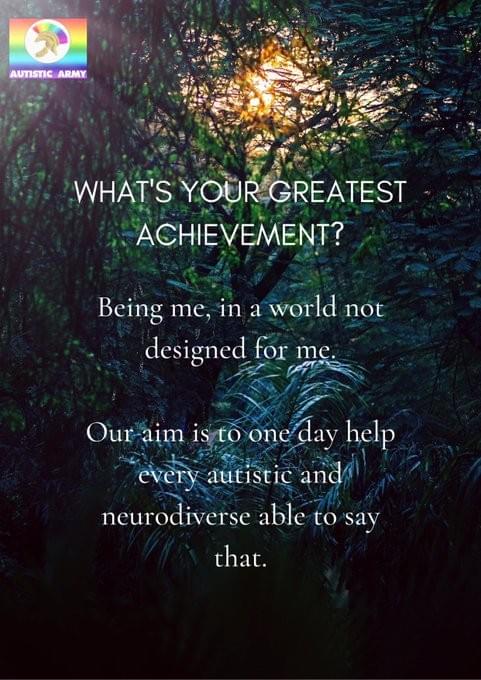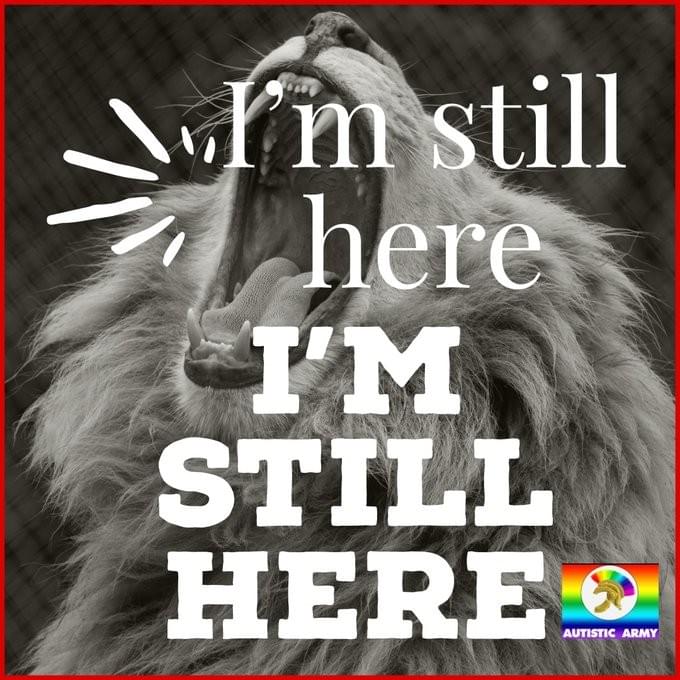
Your Greatest Achievement
Being yourself in a world that isn’t designed for you.
I understand the message this meme is driving at, but would qualify it, since a) everyone can say the same thing (and would, in an age of narcissism); b) there is an implication that the world should be designed around each discrete ‘you’; and c) the road to freedom and happiness lies beyond the self-regarding, self-assertive ‘I.’
The world will never be designed around ‘you,’ and it is anto expect that it ever could be. Autistic people are asking for ‘reasonable adjustments,’ more accommodation from others rather than having ‘society’ constantly demand it from them, greater understanding and acceptance.
I described autism in a way that my personal trainer at the gym found helpful – it is like being left-handed in a world that has been designed by right-handed people for right-handed people. ‘That’s a good way of describing it,’ she said. Whilst this is a quick and simple way to get the point across, its one-dimensional nature doesn’t remotely do justice to the multi-dimensional nature of the condition in its living. In a literal sense, the phrase sums up perfectly the condition of left-handed people living in a right-handed world, not the condition of those in possession of a wide array of ‘left-hands’ of uneven facility in a world that makes multiple demands. But, point made, since the world and the people in it will never be totally left-handed, you are challenged with the demands of mutual adjustment. This is incredibly difficult for those who principal modi operandi are out of kilter with the 'normal' folk of the 'normal' world. In those circumstances there will always be pressure on the odds and eccentrics to change their behaviour so that it accords with the majority view. This is not mutual readjustment and realignment but one-way accomodation. It takes great strength of character - and immense energy - to resist such pressure. To have resisted everyday and to have carried on the resistance to the present day is an immense achievement.
‘Being yourself’ is something that is incredibly difficult for anyone to do in a supra-individual world of supra-individual forces, demands, and responsibilies. Indeed, I would argue strongy that the ‘self’ in
any meaningful conception of ‘self-realisation’ or ‘self-actualisation’ possesses an ineliminably social component. This is where things get doubly difficult for autistic people, given the trademark social impairments associated with the condition. ‘Being social’ is at least as horrendously challenging to people with ASC as is ‘being yourself’ for ‘normal’ people in a world that is so much bigger than any of us.
The demand is not that the world should be designed around ‘us.’ The corollary of such a view is that there ought to be as many worlds as there are discrete individuals. The demand is for a certain re-adjustment on the part of ‘the world,’ that is, on the part of others’ behaviour, a little accommodation, enough to allow autistic people to spend their energies realising and exercising their potentials rather than merely surviving. I have read many accounts that autistic people give of their struggles with the world and it is striking how low they pitch their dreams, ambitions, and achievements. They describe their coping mechanisms and their ability to survive, asking negatively for the absence or reduction of stress and uncertainty rather than for some positive good constitutive of true freedom and happiness. There is something badly amiss when your greatest achievement is to have survived. But I can certainly understand why mere survival could be valued so highly – the world can be a hostile place to those whose equipment to negotiate its everyday demands is seriously impaired in certain ways.
The lack of help is bad enough, but sometimes it is the ‘help’ that well-meaning people ‘offer’ that can be the greatest obstacle all to peace and contentment. I’ve found this to be the case with respect to various agencies and organisations charged with the task of spreading their meagre resources thinly across an empire of social need. Their ‘solutions’ tend to involve coping strategies that cost them little in terms of time and money – the onus of responsibility is upon the autistic person to make the necessary changes. I’ve had all of this – suggestions of ear plugs / headphones to cope with noise stress, making lists, keeping journals, writing stresses and strains down to externalise and analyse them, joining ‘clubs’ (a cycling club, even though I can’t ride a bike), visit libraries, get active, develop an ‘interest.’ I could cry. I have done all such things for as long as I can remember and I would suggest that most autistic people do such things, quite naturally, as a way of coping with the stresses arising from their condition.
So I shall add another negative ‘achievement’ to the list – to have developed and honed to almost perfection the coping strategies that experts and professionals recommend when ticking their organisational boxes. Talk about taking coals to Newcastle. And then we come to breathing techniques, mindfulness, and Cognitive Behaviour Therapy. I notice how all such ‘solutions’ place the onus of responsibility on the individual and emphasise a self-change and require nothing by way of societal change.
And then we move beyond the professionals and experts, the personifications of organisational functions, to people with whom you have ordinary social contact. If you are lucky, you may have family and friends, or a job and hence work colleagues, just people with whom you are in regular contact. These are the people who are well-intentioned but whose ‘help’ can often be the greatest hindrance, for the very reason that it is couched in the emotional imperatives of friendship. Such people can push you into areas that make complete sense to them but which threaten to short-circuit your own coping strategies. The things that work for some people, even most people, will not necessarily work for you. I will guarantee that those who are autistic will have had the same experiences as me on this; they will have heard admonishing, perplexed others demanding to know why they don’t do things the way others do them, why they never listen / do as they are told, why they do it all wrong. The assumption is that what works for others will work for you, that what is right for others is right for you. It is the hardest thing to get the point through to such people that you are not those ‘others’ and that your way of doing things differently, however inefficient, even ineffective it may seem, perfectly expresses your different way of processing information.
When you resist helpful others on account of the above, theproblem comes to be considered self-authored – you are the architect of the things that afflict you, just as you have been told from the very first. To have spent a lifetime hearing uncomprehending others say that ‘you’re only making it worse for yourself’ and yet still bear up and persist along your narrow path is an immense achievement. I learned to have the confidence to trust my own instincts and judgements and cleave to my own way of doing things. Time and again it is the ways of others that have led me astray.
It is no wonder that autistic people can prefer their ownself-contained world, trying to be as self-sufficient as they possibly can be in a social world.
Resisting the pressure to do certain things suggested by ‘helpful’ but uncomprehending others whilst maintaining friendly relations with them is both a challenge and an achievement. That said, you often have to be forthright in telling people that things are not right for you. To have developed the nerve to speak up and speak out against encircling social pressure is an immense achievement and a good example to have set for others dealing with the same issues.

I’d like to say that my biggest achievement is greater than the roar “I’m still here!,” but the more I think about it, the more impressive that claim seems. Because it is the authentic me that roars, making the statement an existential declaration of independence, something more than mere physical survival. The ‘I’ that has survived and which roars is the ‘I’ of an authentic, unchanging, unimpaired, uncompromising personhood. I have resisted the pressures to conformity and complicity, to fit the requirements of the mad mechanarchy, and am still here. Importantly, the ‘I’ that is ‘still here’ is the original, authentic ‘I’ of old. Regardless of the complaints of others, I remain incorrigibly myself. My biggest mistakes in life have come when trying to do things the way others do them. My greatest successes have come when I have trusted my own instincts and judgements and followed my own pathways. To thine own self be true – you are the expert on yourself. To have set an inspiring example for others to follow is achievement enough, so long as you understand following here to mean following your own star. There are so many stars, as many stars as there are people.
The achievement is not that ‘I am still here,’ but that ‘I am still here.’

